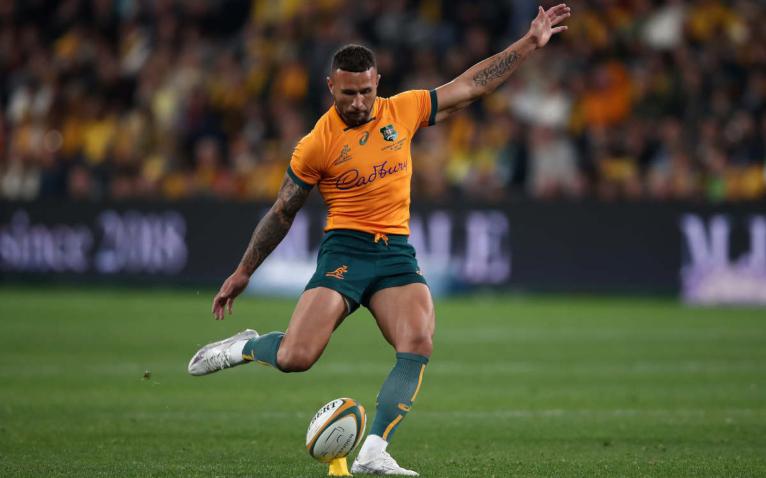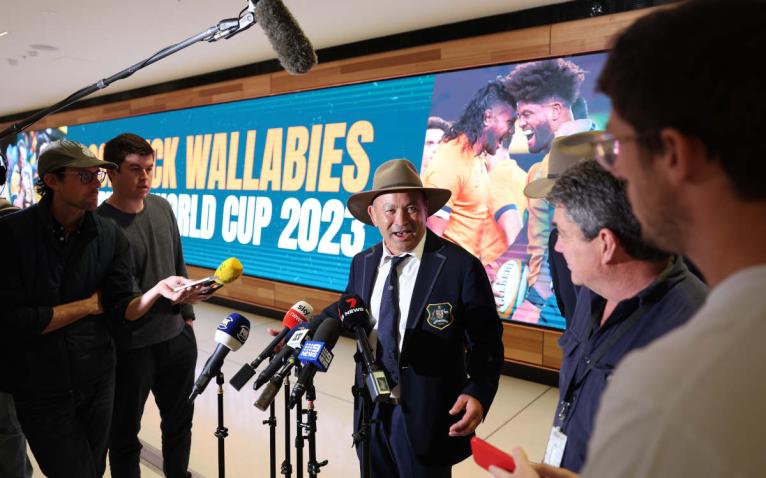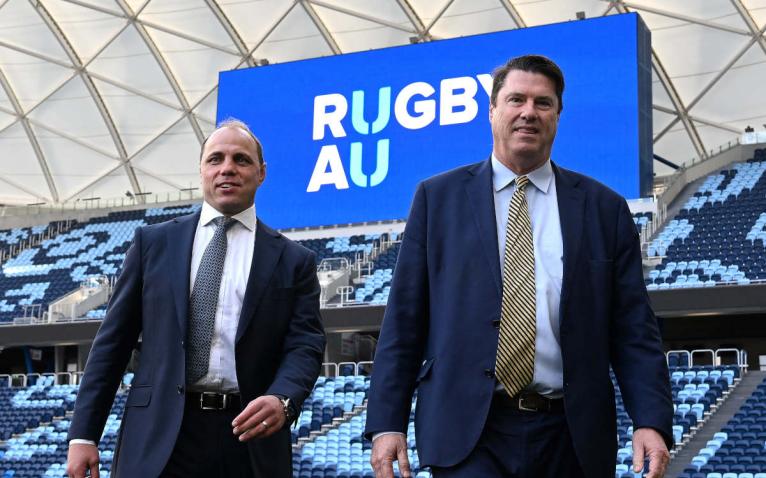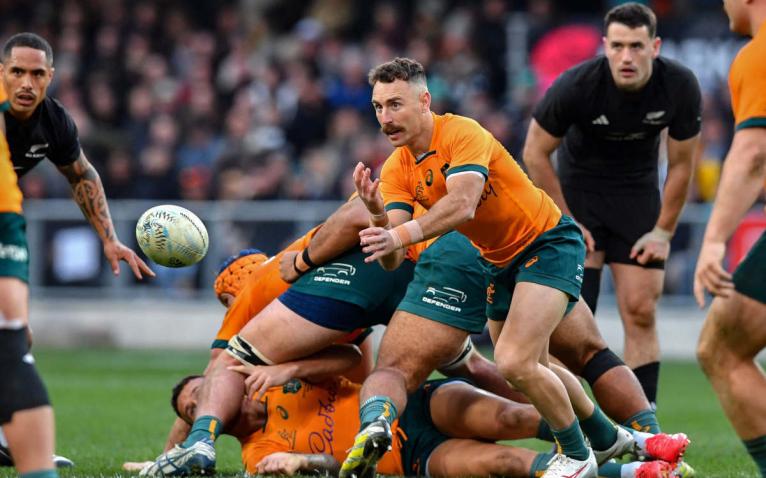With Eddie Jones yet to deliver a win in his second stint as Wallabies coach, the decision to bring him back is being widely questioned by many in the Australian rugby fraternity.
Jones was hired to give a meandering Wallabies side the direction and purpose Rugby Australia felt they had been lacking under Kiwi coach Dave Rennie who himself took over from Michael Cheika in 2020.
Rennie’s Wallabies hadn’t been awful, but with a 39 per cent win ratio in his three years at the helm, nor had they been good enough to convince the top brass that he was the right man to take the team through to the 2023 World Cup.
If it felt harsh on Rennie then, it seems more so now that Jones has had four losses in his first four tests and is already seemingly at war with the Australian media who have relentlessly questioned his selections and strategies.
Throughout the Rugby Championship there were tense exchanges between Jones and journalists over his preference to put the inexperienced Carter Gordon into the No 10 jersey.
And after he picked his World Cup squad that saw Quade Cooper, Michael Hooper and Pete Samu left out and included a host of younger players, three of whom haven’t yet played a Test match, things turned decidedly nasty.
On the eve of the Wallabies departing for Europe, assistant coach Brad Davis decided not to travel, and a press conference at the airport ended with Jones saying: “I know what’s wrong with Australian rugby and you blokes are part of the problem because you’re so bloody negative about everything.

“We’re going off to a World Cup you think we can’t win. You think the selection process is bad because the players complain, so I apologise for that.
“Tell us we’re terrible and we will prove you wrong. I can feel this negativity, I’ve got to wash myself off, it’s sticking to me. Thanks for the worst press conference I’ve ever had in world rugby. Well done, the worst I’ve ever seen.”
But while RA chairman Hamish McLennan, who drove the initiative to switch coaches earlier this year, hasn’t enjoyed seeing the Wallabies lose four from four, there is no regret about the decision.
Jones wasn’t brought in with the expectation he would be able to transform the Wallabies quickly and this appears to be the source of tension between him and the media.
The Wallabies have been an unsuccessful team for a long time and Australian rugby has been poorly managed poorly for even longer.
To change the trajectory of the team requires an enormous rebuild that McLennan knows is going to take much longer than one year and that Jones can’t do alone.
Jones insists he’s picked a squad that he feels can win this World Cup, which is no doubt how the effervescent coach genuinely feels, but it’s equally true that he’s picked a group with an eye to the future as well.
There are too many things wrong with rugby in Australia to believe that even Jones could turn up, wave a magic wand and fix everything in a few weeks or months.
He was given a five-year contract for a reason. RA are after a long-term fix and a total rebuild.
And if that wasn’t apparent when Jones was initially appointed, it should be now that he’s picked a World Cup squad that looks more about preparing the team for 2027 than it does trying to win 2023.
Jones insists he’s picked a squad that he feels can win this World Cup, which is no doubt how the effervescent coach genuinely feels, but it’s equally true that he’s picked a group with an eye to the future as well.
“I’ve backed the young blokes because they earned it,” he said when he unveiled his 33 players.

“Simple as that. I haven’t handed it to them. They grabbed it. It’s exciting for me to go to work each day with these guys who are just busting to improve, to learn and to get better.”
The more pertinent question to be asking about Jones is not what he can achieve with this team in 2023, but whether he stands a realistic chance of turning them into world champions by 2027?
It’s an enormous challenge as he needs so many parts of the overall development system to be changed and for Rugby Australia to get its act together commercially.
The game has lost enormous ground to the three other football codes – particularly the NRL and AFL.
After winning World Cups in 1991 and 1999 and then reaching the final in 2003 when the tournament was in Australia, rugby was well-placed to boom.
But Rugby Australia, made a major strategic error with its broadcast contracts, by opting to exclusively work with pay TV operator Fox Sports.
A second almost catastrophic error was made in 2019 when former chief executive Raelene Castle snubbed Fox, preferring instead to put the contract out to tender.
It was financially rewarded for its loyalty, earning $57m a year between 2016 and 2021, but it lost market share to the NRL and AFL who both worked hard to get their content on Free to Air.
A second almost catastrophic error was made in 2019 when former chief executive Raelene Castle snubbed Fox, preferring instead to put the contract out to tender.
It saw RA take a huge pay cut to $29m a year – which put the whole business under enormous financial pressure.
Things got so bad, that they ended up having to borrow money from a US hedge fund manager at an exorbitant rate and lost $27m loss in 2021.
So too was rugby slow to realise that the AFL and NRL were aggressively targeting young rugby players.
And it wasn’t just that these codes were organised and smart in their recruitment strategies, the problem was compounded by rugby having no clear development pathway of its own.

The likes of Cameron Murray, Angus Crichton and Kaylan Ponga were all in rugby’s system before the NRL snaffled them and so one of the first things that needs to be fixed is the protection and promotion of talent.
This is about having better relationships between RA and the Super Rugby clubs and more critically, investing more in identification and development programmes.
This is where McLennan comes in, because he’s a seasoned business operator, used to the rough and tumble of Australia’s corporate world.
Already, he’s been instrumental in enabling RA to get back into the black – they posted an $8m profit this year – and he’s preparing the ground for a private equity investment that will come with a considerable cash injection.
“It won’t happen overnight,” says McLennan. “We make no excuses for where we are at, but it is a complete rebuild.
“I have absolute faith in Phil Waugh [new chief executive of RA] and Eddie Jones to rebuild our structures and pathways. And there is a strong buzz building in Australia.”
The deposed Rennie may wonder why he had to be pushed aside as part of this grand vision, as why could he not have been afforded the same leeway and opportunity to rebuild the team as part of a longer-term transformation?
Australia’s elite schools are guilty of producing entitled sorts who know there is a trust fund waiting and this mentality is embedded in the Wallabies.
And the answer to that is because McLennan believes that Jones brings something Rennie didn’t – which is the ability instil a harder edge within the squad.
Rugby, much like in England, Scotland and Ireland, is a game played mostly by those with wealth and privilege.
Australia’s elite schools are guilty of producing entitled sorts who know there is a trust fund waiting and this mentality is embedded in the Wallabies.
The most telling statistic which proves that is the Wallabies record against the All Blacks.
Since the All Blacks took back the Bledisloe Cup in 2003, they have beaten Australia 46 times, lost nine and drawn three and typically what separates them, is that one team is mentally tough and capable of holding their nerve in the big moments, while the other one isn’t.

The Wallabies want to learn how to be tougher in the big moments and McLennan feels Jones can teach them how, because he is not from privilege and having grown up on the wrong sides of the tracks with a strong Japanese heritage, he’s had to fight for everything: for acceptance, for recognition, for respect.
For too long the Bledisloe Cup has been more of a curse than a blessing for the Wallabies.
They get to play the All Blacks more than any other country on the planet and exposure to a team that is relentlessly good, organised and tough to beat, should really have helped the Wallabies develop their own game more than it has.
Australia needs to re-set and see the Bledisloe as an incredible opportunity to help them become tougher and more clinical.
But instead of being able to learn and grow by playing the All Blacks so many times, the experience has in fact inflicted psychological damage on the players, while making it hard for the Australian rugby public to believe in their team.
Australia needs to re-set and see the Bledisloe as an incredible opportunity to help them become tougher and more clinical.
“Winning a Bledisloe falls only a tad short behind winning the World Cup,” says McLennan.
“It is of paramount importance and every rugby fan in Australia wants it to happen. A big part of my personal motivation is the desire for us to win a Bledisloe.
“We haven’t been good enough and we have to be tougher so good on the Kiwis for creating such a legacy.
“But we will get it back at some point. For what it is worth we have identified the problems in our system, and we have taken steps to rectify them which will lead to better performance and success breeds success.”



Great article but the take on private schools is just wrong!! Most if not all “private school” kids who end up in professional rugby are not even close to being “trust fund” kids. They are in fact far more likely to be kids who earned scholarships to those schools and took the opportunity to take up an education. Private schools are keeping the game alive in Australia - I didn’t even go to one but I know for a fact they receive f all from rugby Australia and fund programs because of tradition and because students, ex students and parents love the game. Even private schools in aus are falling out of love with it now and the constant criticism of them for doing so won’t help.
Excellent summary
The team isn’t weak because of they are all rich kids. It’s that the selection pool is so narrow. The private schools are the only ones putting money resources talent ID and coaching into juniors and they only have so many squad places available. Then there’s not much between school and super squads. Kiwis have the mitre 10 sitting between super level and club. NRL nearly 20 teams so they can pay 18 year olds to develop in a professional environment. The good Aussies have bugger all competition for spots so not enough of them work hard enough AND late bloomers are forced to go overseas. Mike alaatoa and Pete samu went to crusaders. Adam coleman and Matt Phillip the western force Fergus Lee Warner the force Scott fardy probly the best late bloomer to a small Japanese club